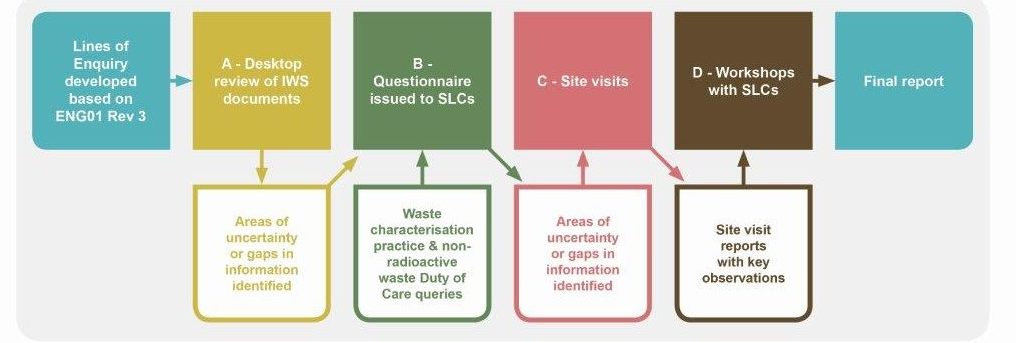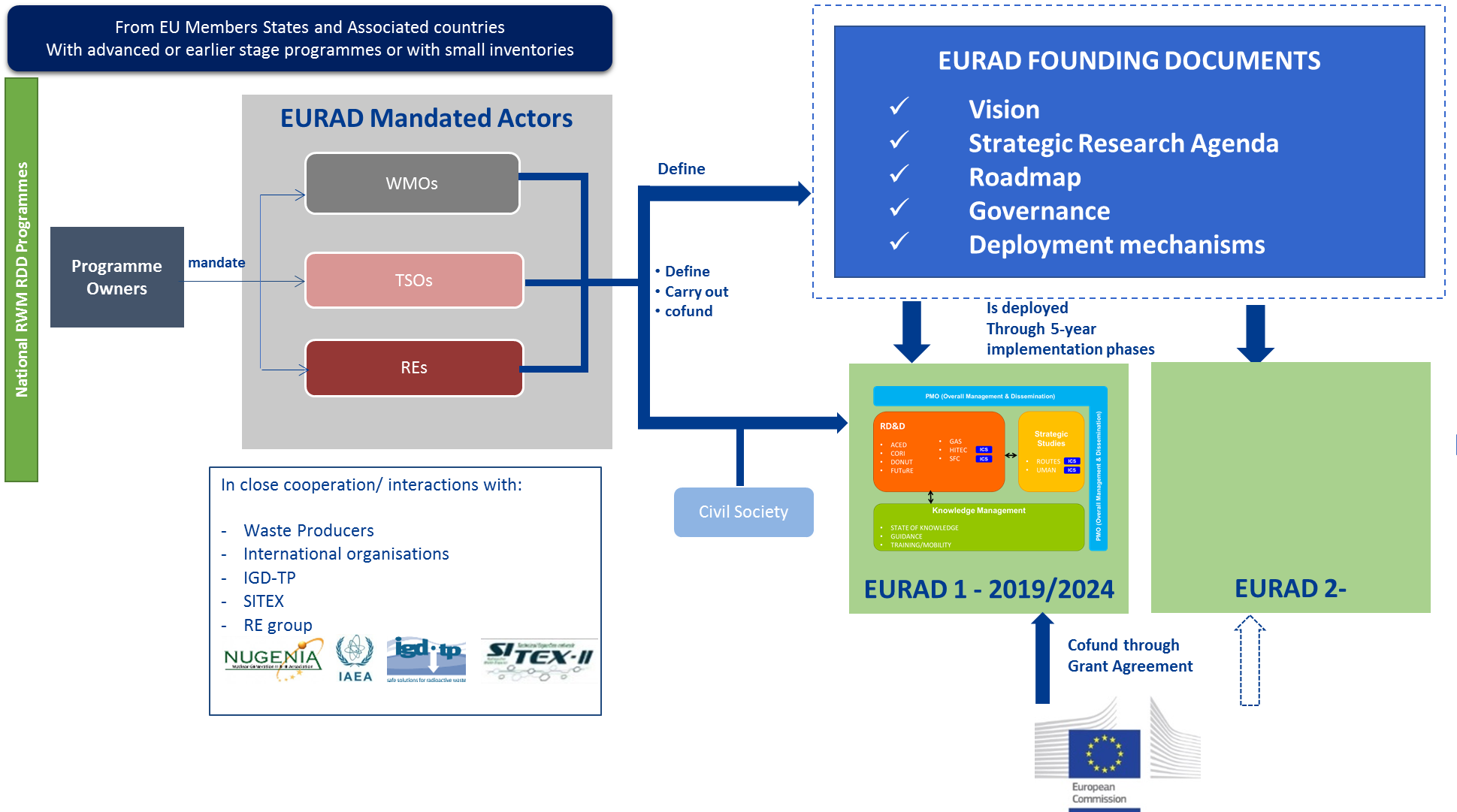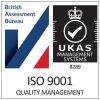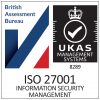National Waste Management Strategies and Disposal Programmes
Development of the European Joint Programme on Radioactive Waste Management and Disposal (EURAD) Founding Documents (2018)
MCM worked with Andra to support the establishment of Founding Documents for a European Joint Programme (EJP) on Radioactive Waste Management and Disposal (EURAD). Following decades of research, development and demonstration (RD&D) in support of the safe management and disposal of radioactive waste, EURAD proposes to coordinate activities on agreed priorities of common interest between European Waste Management Organisations (WMOs), Technical Support Organisations (TSOs) and Research Entities (REs).
The EURAD proposal was submitted in September and presented to a wide audience at the IDG-TP Exchange Forum in December, with evaluation to take place over the coming months and a European Commission (EC) target to launch EURAD at EURADWASTE 2019.
Peer Review of the RWM ‘Backfilling, Sealing and Closure – Phase 2’ Project (2018)
Dr Tara Beattie (MCM) supported ARUP by leading led expert peer review of the RWM Phase 2 Backfilling, Sealing & Closure Project. Specifically Tara reviewed the post-closure impacts of operational materials left in situ at closure, covering 6 illustrative designs and numerical evaluations for potentially significant THMBC processes. Jake Kinghorn-Mills (MCM) reviewed the document from a systems engineering perspective, commenting on process and procedure.
Nuclear waste management financing (2016)
MCM was contracted to the University of Pretoria in order to provide a summary of nuclear waste management financing approaches around the world and summarise this through a benchmarking activity covering:
- Predicted costs, actual costs and associated uncertainties
- Financing options and evolution
- Lessons learned, highlighting successes and failures
Working papers were authored and delivered to the University, providing them with guiding principles for the establishment of financing and funding structures for decommissioning and waste disposal programmes along with illustrative case studies highlighting cost components and associated uncertainties and an assessment of international national waste management fund management.
Review of NDA site licence companies integrated waste strategies (2015)
MCM, with partners PT&C, completed an assessment of Site Licence Company (SLC) Integrated Waste Strategies (IWS) across the Nuclear Decommissioning Authority (NDA) estate against the requirements of ENG01 Revision 03. This involved a review of both the IWS documents and how SLCs applied the Integrated Waste Strategy guidance to support waste management. This assessment was coupled to an appraisal of how waste characterisation is managed across the NDA estate and included a review of the supporting processes, procedures and how it is used to support decision making. The management of non-radioactive and hazardous wastes were also reviewed, including how the waste hierarchy and duty of care are applied. The Figure below illustrates the approach to conducting this work.

Input to South Australian Geological Disposal Business Case (2015)
The Australian government has established a Royal Commission to assess the potential benefits of South Australia becoming involved in all aspects of the nuclear fuel cycle, including offering storage and disposal services to other countries.
Charles and Neil delivered a number of reports to the Royal Commission , providing them with an understanding of the options available with regards to geological disposal, specifically focusing on the requirement for a bespoke safety case to demonstrate the safety of geological disposal in a particular geographical context. Follow on collaboration saw MCM work with Jacobs Engineering in preparing an initial business case to indicated what the economic advantages might be for South Australia in the field of nuclear fuel cycle activities.
Gas Generation in Japanese TRU Disposal Facility (2014)
Working with nuclear experts at Japan’s Obayashi Corporation, MCM supported the investigation of processes which could lead to gas generation in the Japanese Transuranic Waste (TRU) repository and calculated gas generation rates for various sources, taking into considering the Engineered Barrier System (EBS) evolution in the repository.
Direct Disposal of Spent Fuel in Japan (2014)
Tara supported QJ Science in analysing existing international concepts which could be adapted for the direct disposal of spent fuel for the Japan Atomic Energy Agency (JAEA). This involved analysis of the concepts put forward in Sweden, Finland, France, Switzerland, Belgium, Canada, South Korea, UK, China, South Africa, Russia, USA and Germany.
NECSA; South African Nuclear Energy Corporation Limited (2013)
MCM has been involved in projects to help develop various aspects of the South African Spent Fuel management strategy. Specific studies have been carried out on:
- Storage Options for Spent Fuel
- Multi-attribute Analysis of Integrated Management Systems for Spent Fuel
- A Comprehensive Strategy for Management of Spent Fuel in South Africa
- Viability of Indigenous Reprocessing of Spent Fuel
Assessment of the Potential Benefits of Regional, Multinational Cooperation (2013)
MCM has studied the safety, security and economic benefits of regional cooperation between countries in radioactive waste management. The societal and political challenges faced when this cooperation extends to shared storage or disposal facilities has also been analysed. Our work has covered regional initiatives in Europe, in the Arab regions and also in Asia. MCM staff members have led relevant European Commission projects, authored and co-authored a series of IAEA advisory documents, and also performed country-specific studies on multinational cooperation for various national programmes including Italy, South Korea, Switzerland, and the UAE.
Integrated National and Regional Radioactive Waste Management Strategy for the UAE (2012)
The United Arab Emirates (UAE) is one of the most dynamic new nuclear nations, with the first two of a planned series of 8 nuclear power plants currently under construction. MCM carried out a comprehensive and strategic study, investigating options for the management of radioactive waste. This partnership was managed through the Permanent Mission of the UAE to the IAEA – an interface between the UAE Government and the IAEA and involved a range of analysis and study, covering nuclear power scenarios, spent fuel and LILW storage and transport and disposal facility siting considerations and design concepts, including an analysis of regional sharing options.
MCM delivered a proposed national strategy for the safe management of spent nuclear fuel and radioactive wastes in the UAE and a waste management roadmap, illustrating a potential path to safe disposal, with particular focus and consideration of important, shorter-term decisions which were deemed important to consider given their effect on any implementable radioactive waste management plan, whilst maintaining maximum flexibility.
Review of alternatives options for managing radioactive waste (2011)
As part of the Strategic Environmental Assessment (SEA) process, the RWM is required to consider and report on reasonable options and alternatives for managing radioactive waste. MCM was contracted to draft the preliminary review of current options including alternatives to direct disposal (storage and partitioning and transmutation) and alternative ways of disposal to geological disposal (near-surface disposal and deep borehole disposal). A central aspect of the review was to highlight the potential implications for geological disposal if a decision were taken to route some of the disposal inventory towards one of the alternatives, as keeping this possibility under consideration will be important for RWMs strategic planning. For example, it could affect the design, size or time scheduling of a Geological Disposal Facility.
Managing nuclear waste in the Republic of Korea (2011)
MCM co-authored with the Centre for Strategic and International Studies (CSIS) of the USA a study for KAERI on “Managing Nuclear Waste in the Republic of Korea: Issues and Options”. This looked at the safety and security of all strategies for managing spent fuel from the Korean programme.
Several MCM Staff Members were closely involved with the buildup of the Swiss national radioactive waste management programme for over 20 years, from its early phases.
Estimating the cost for disposal of UK New Build waste (2006)
MCM supported UK Government with advisory services and contributed to cost estimations for a range of scenarios to manage waste arising from New Build reactors. International (and UK) data was used to estimate UK disposal costs for the 2006 baseline radioactive waste inventory (CoRWM baseline) and then new build spent fuel disposal costs have been estimated as a proportion of these, thus showing the incremental cost to the UK of disposing of spent fuel from a new nuclear power programme. Owing to the ability to use existing international repository system designs, it is possible to make an estimate of UK costs by scaling to other national cost estimates, making some assumptions in the process. To do this requires identification of the most appropriate international data on waste disposal costs, using relevant disposal designs.
« Back to view all case studiesIf you'd like to enquire about this or a similar project...
Click here »









